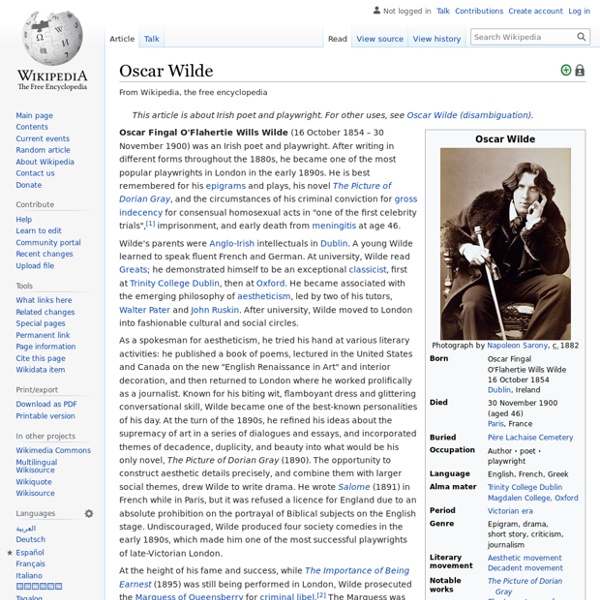Oscar Wilde - Wikipedia

Edgar Allan Poe - Wikipedia
American writer and critic (1809–1849) Edgar Allan Poe (né Edgar Poe; January 19, 1809 – October 7, 1849) was an American writer, poet, editor, and literary critic who is best known for his poetry and short stories, particularly his tales involving mystery and the macabre. He is widely regarded as one of the central figures of Romanticism and Gothic fiction in the United States and of early American literature.[1] Poe was one of the country's first successful practitioners of the short story, and is generally considered to be the inventor of the detective fiction genre. Poe was born in Boston. Poe switched his focus to prose and spent the next several years working for literary journals and periodicals, becoming known for his own style of literary criticism. In January 1845, he published his poem "The Raven" to instant success. Poe's works influenced the development of literature throughout the world and even impacted such specialized fields as cosmology and cryptography. Philadelphia
Heureux qui comme Ulysse, Du Bellay
Van Gogh « Heureux qui comme Ulysse » est sans aucun doute le plus célèbre des poèmes de Joachim Du Bellay. Vous en trouverez ici une analyse détaillée avec plusieurs problématiques possibles à l’oral de français. Heureux qui comme Ulysse : Introduction Le sonnet « Heureux qui comme Ulysse » fait partie du recueil des Regrets, publié en 1558, au retour de Du Bellay en France après un séjour de quatre ans à Rome. Cliquez ici pour lire le poème « heureux qui comme Ulysse » Autour des thèmes du voyage et de l’exil, Du Bellay propose un poème à la fois lyrique et critique, qui atteste de son expérience personnelle comme de son héritage et de son projet poétiques. Problématiques possibles sur « heureux qui comme Ulysse » : ♦ Quelles sont les marques du registre lyrique (ou élégiaque) dans ce poème ? Ce sonnet élégiaque qui exprime la douleur de l’exil (I) se prolonge dans un parallèle entre Rome et le pays natal (II) et témoigne du projet poétique et humaniste de Du Bellay (III). A. B. A. B.
Related:
Related:



